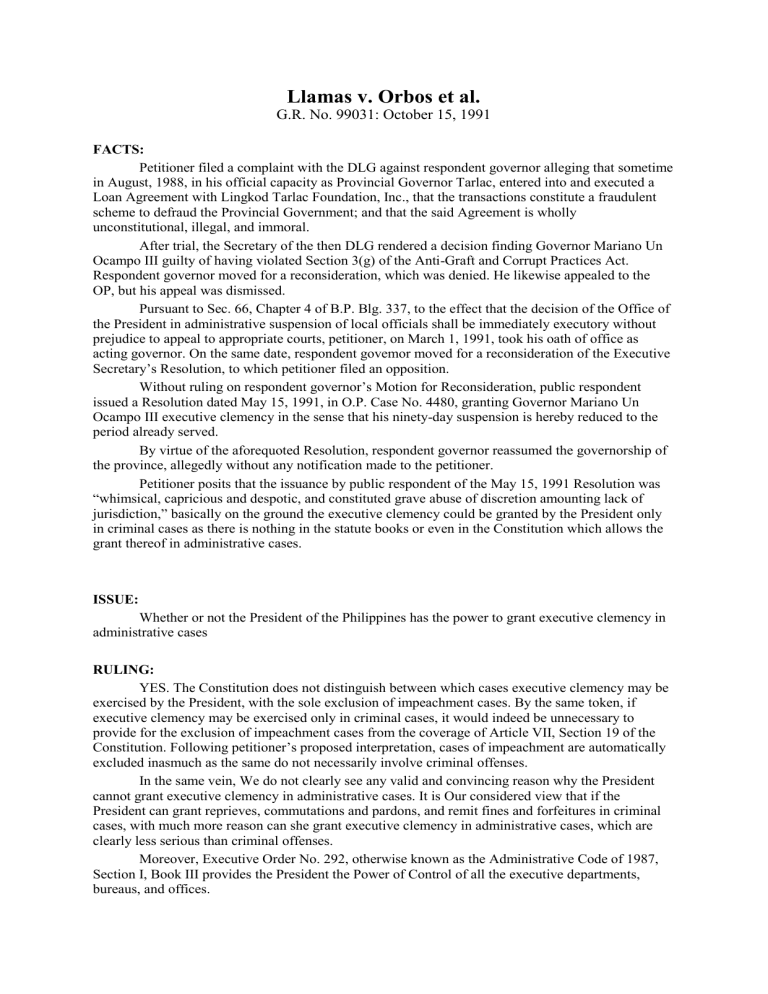13 Digest Llamas v. Orbos et al., G.R. No. 99031, October 15, 1991
advertisement

Llamas v. Orbos et al. G.R. No. 99031: October 15, 1991 FACTS: Petitioner filed a complaint with the DLG against respondent governor alleging that sometime in August, 1988, in his official capacity as Provincial Governor Tarlac, entered into and executed a Loan Agreement with Lingkod Tarlac Foundation, Inc., that the transactions constitute a fraudulent scheme to defraud the Provincial Government; and that the said Agreement is wholly unconstitutional, illegal, and immoral. After trial, the Secretary of the then DLG rendered a decision finding Governor Mariano Un Ocampo III guilty of having violated Section 3(g) of the Anti-Graft and Corrupt Practices Act. Respondent governor moved for a reconsideration, which was denied. He likewise appealed to the OP, but his appeal was dismissed. Pursuant to Sec. 66, Chapter 4 of B.P. Blg. 337, to the effect that the decision of the Office of the President in administrative suspension of local officials shall be immediately executory without prejudice to appeal to appropriate courts, petitioner, on March 1, 1991, took his oath of office as acting governor. On the same date, respondent govemor moved for a reconsideration of the Executive Secretary’s Resolution, to which petitioner filed an opposition. Without ruling on respondent governor’s Motion for Reconsideration, public respondent issued a Resolution dated May 15, 1991, in O.P. Case No. 4480, granting Governor Mariano Un Ocampo III executive clemency in the sense that his ninety-day suspension is hereby reduced to the period already served. By virtue of the aforequoted Resolution, respondent governor reassumed the governorship of the province, allegedly without any notification made to the petitioner. Petitioner posits that the issuance by public respondent of the May 15, 1991 Resolution was “whimsical, capricious and despotic, and constituted grave abuse of discretion amounting lack of jurisdiction,” basically on the ground the executive clemency could be granted by the President only in criminal cases as there is nothing in the statute books or even in the Constitution which allows the grant thereof in administrative cases. ISSUE: Whether or not the President of the Philippines has the power to grant executive clemency in administrative cases RULING: YES. The Constitution does not distinguish between which cases executive clemency may be exercised by the President, with the sole exclusion of impeachment cases. By the same token, if executive clemency may be exercised only in criminal cases, it would indeed be unnecessary to provide for the exclusion of impeachment cases from the coverage of Article VII, Section 19 of the Constitution. Following petitioner’s proposed interpretation, cases of impeachment are automatically excluded inasmuch as the same do not necessarily involve criminal offenses. In the same vein, We do not clearly see any valid and convincing reason why the President cannot grant executive clemency in administrative cases. It is Our considered view that if the President can grant reprieves, commutations and pardons, and remit fines and forfeitures in criminal cases, with much more reason can she grant executive clemency in administrative cases, which are clearly less serious than criminal offenses. Moreover, Executive Order No. 292, otherwise known as the Administrative Code of 1987, Section I, Book III provides the President the Power of Control of all the executive departments, bureaus, and offices.